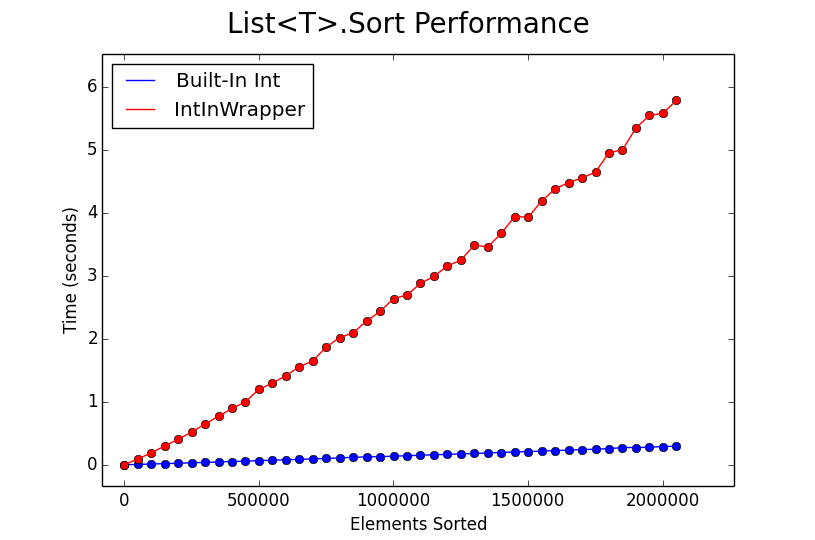C# Sorting Woes
I was having some fun implementing sorting algorithms and thought it might be interesting to compare my implementations against the C# built in List<T>.Sort. That was where the rabbit hole started.
Slow Quicksort
After finishing an implementation of quicksort I decided to give it a try on some big input. I wrote something to generate integer lists of arbitrary size with uniformly random elements. I ran some benchmarks, and then ran the same input against List<T>.Sort. My implementation was about ten times slower than the built in sort. I thought I must be doing something wrong. There must be some bug in my code. After all, the description of List<T>.Sort states that (from here)
- If the partition size is fewer than 16 elements, it uses an insertion sort algorithm.
- If the number of partitions exceeds 2 * LogN, where N is the range of the input array, it uses a Heapsort algorithm.
- Otherwise, it uses a Quicksort algorithm.
So the built-in sorting should be using Quicksort most of the time. I thought my implementation might just be slow, so I started to make some optimizations. My base implementation can be found here:
https://github.com/mattnedrich/algorithms/blob/master/csharp/sorting/quicksort/Quicksorter.cs
First I tried to in-line all of the function calls (e.g., ChoosePivotIndex and Swap). This yielded some performance improvement (about 10%). Next I played around with the pivot selection method. I was using a naive random pivot selection so I tried a median of three approach. This actually didn’t do much, though I suspect it is because my input was uniformly random. I tried parallelizing the calls to Partition. This actually slowed things down (probably due to the overhead of thread creation). Lastly, I cheated a bit and switched to insertion sort for small inputs, as the library sort does. This yielded the latest performance gain of around 20%. However, after all of my optimization, I was still around eight times slower than List<T>.Sort.
I was stuck, so I posted this, and learned that the .NET Framework special cases the sorting of built-in types (ints, string, etc). Just how much of a performance gain is achieved by doing this? I wanted to find out so I set up yet another experiment.
Int vs. IntInWrapper
I compared the performance of List<T>.Sort when using plain ol’ int’s to the performance when using int’s in a wrapper class. For the wrapper class I used:
public class IntInWrapper : IComparable<IntInWrapper> { public int Val { get; set; } public IntInWrapper(int val) { Val = val; } public int CompareTo(IntInWrapper other) { if (this.Val < other.Val) return -1; else if (this.Val == other.Val) return 0; else return 1; } }
I benchmarked sorting Lists of various sizes for the two input classes. Results are shown below. For each List size, sorting was performed ten times (each time on a different randomized list), and the average execution time was kept.

Sorting on wrapped int’s drastically degrades performance compared to plain int’s. From my understanding, this is largely due to the IComparable<T>.CompareTo function pointer being used for element comparison, rather than a simple > or < (which likely trickles down to a single assembly instruction). Anyway, the key learning from this is that use built-in types when you need sorting performance and be aware of the penalty associated with using custom types!